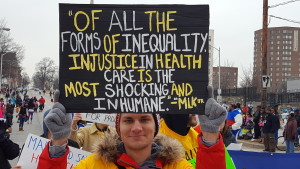Single-payer system would alleviate misuse of emergency rooms
June 4, 2011
Baltimoresun.com
4:37 PM EDT, June 1, 2011
The headline reads emergency room visits at Howard County General Hospital “might hit a high mark” this year. We know this means that the ER is being misused as a source of primary care. Don’t feel bad, Howard County; in Massachusetts, the model for national health reform, emergency room visits hit a new high last year, and they have under 5 percent with no health insurance, while Maryland has a close to 15 percent uninsured.
The overuse of the ER is a symptom of the lack of primary-care providers in the county. Why the shortage? It is our faith in the markets to make things work. Health Insurers have the upper hand; they decide what primary care is worth. The result is the pay is too low to attract enough primary-care providers.
The reliance on a profit-driven market place to make the medical system work is a problem beyond a shortage of primary care in wealthy county like Howard. The cost of health insurance has more than doubled in the past nine years and the employee share of this expense is rising. Wages have not and cannot keep up with this pace. Before too long most of our salaries will be going to health insurance.
There is a better solution. It is a single-payer health-care system, a program like Medicare that includes everyone but with expanded coverage. The administrative waste in health care is staggering. We spend over 1/3 of our health care dollars on it. Administrative hassles eat up over 10 percent of our doctors’ time that could be put to patient care. A government-run, taxpayer-financed privately delivered system would eliminate much of this waste.
The payment system is streamlined; the middle man (health insurers) is gone. Decisions about doctor pay and distribution of resources can now be made based on medical need first and then profit. With the savings, health-care coverage could be made universal, and expanded to include all needed medical services plus dental and pharmacy. The academic studies to prove this have been done, repeatedly. More importantly, international experience with single-payer systems show the same outcome.
Vermont has passed legislation that will lead to universal health care based on a single-payer system in their state. The Vermont bill starts from the principle that access to health care is a human right. Right now, health care is being treated as a commodity, rationed based on ability to pay. Maryland has similar legislation to Vermont; the Maryland Health Security Act (SB 388). I urge you to find out about it.
Eric Naumburg
Columbia
Eric Naumburg, M.D., is Maryland Health Security Act coordinator for Healthcare-Now of Maryland.
www.baltimoresun.com/explore/howard/opinion-talk/letter-editor/ph-ho-cf-letters-060211-7-20110601,0,818858.story






